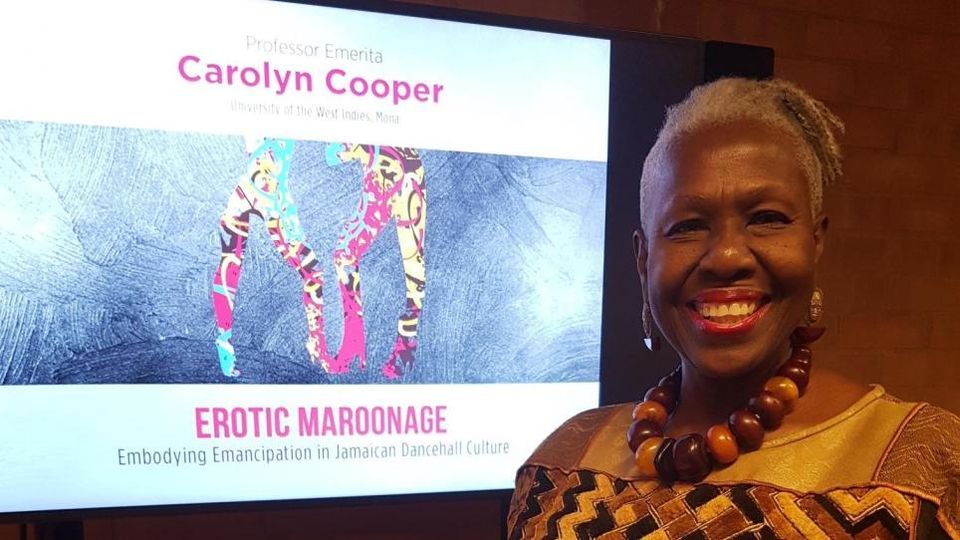Professor Carolyn Cooper and Nike Jonah

On the evening of 12 March, Central welcomed academics, artists, industry friends and partners and members of its wider staff community for an evening of events focusing on fellowship and providing a space for a proper conversation and the re-charging of energies and imaginations.
The evening - which was curated by Decolonising the Archive and Central Research - opened with Professor Carolyn Cooper, Visiting Fellow and Professor of Literary & Cultural Studies at the University of the West Indies, Mona, Jamaica and her lecture entitled Erotic Maroonage: Embodying Emancipation in Jamaican Dancehall Culture. The hypersexuality articulated in the lyrics of Jamaican dancehall DJs is conventionally dismissed as pure vulgarity, or “slackness” in the Jamaican vernacular. In her talk, Professor Cooper argued that it ought to be retheorized as a decidedly political discourse, a stage on which women and men act out rituals of release from historical roles of oppression.
Following this lecture, Central’s Visiting Research Fellow Nike Jonah hosted the second in her series of her salon style ‘family dinners’, part of three which are to be held at Central throughout this academic year. Bringing together staff from across all areas of Central’s community, the aim for each of Nike’s dinners is to gather together people with a willingness and enthusiasm to push diversity conversations into action. Joining Central staff at the dinners are other like-minded people from across the arts with their own great insights and stories to share. On this evening, and alongside Nike Jonah and Professor Carolyn Cooper, Central was delighted to welcome dancer and choreographer Gerrard Martin, and composer and playwright Michael Scott.
For her first dinner in November, Nike welcomed Dr Funmi Adewole, Vc2020 Lecturer/ Associate professor of Dance at DeMontford University and former chair of Association of Dance of the African Diaspora; multidisciplinary artist Mohammed Ali (aka Aerosol Arabic), whose work regularly interrogates arts and Islam within contemporary Muslim society; Arts Council England Changemaker, producer and activist Kayza Rose; and Julie McNamara, a theatre maker and Artistic Director of Vital Xposure.
Visiting Research Fellow at Central, Nike Jonah, said:
“The salon facilitated a beautiful exchange and engagement with various departments from across Central. This was inspiring, as many times these departments might not have cause to interact. I was impressed by the enthusiasm of the group to share their inputs and to contribute to the tapestry of what makes Central unique. The salon was a success in cementing the comradery of the staff and, despite a few challenges, I feel that the winning sentiment of solidarity and progress was achieved.”
Jessica Bowles, Principal Lecturer and Central’s Course Leader for the MA/MFA Creative Producing course, worked together with Nike to organise and promote the salon, and said:
“Academia is more than the cerebral, it is about creating beautiful moments in history.”
Connie Bell, from Decolonising The Archive, Curator, Heritage Arts Practitioner and Playwright said:
“The entire fellowship/event was a complete success. The after party (Nike’s salon) gave testimony to how important it is to be a visionary, to act on interdependence via collaboration and to keep a unifying bond even in the midst of challenges.
This formulae can be noted as one for success, influence and true power, as it sends a message within and outside of the familiar circles that groups can work together and create bridges for exchange of culture, ideas and opportunities. This bridge is what eventually creates a passage for peace, promotes wellbeing in communities and saves our world from destruction.”
An audio recording of Professor Cooper’s lecture was captured by Decolonising the Archive, who assisted in organising the fellowship and will be adding the event to their website. This will allow for the discussion to act as a transformative tool, enriching practitioners and helping to inform their practice.

